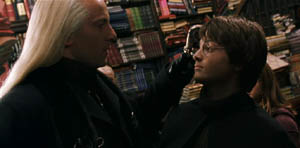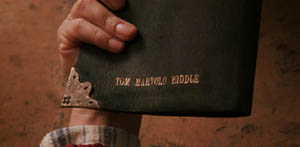|
Already better by half, the second in the Potter series shows that sequels don't necessarily have to pale in comparison to their predecessors. There's still the lamentable fact that novelist J. K. Rowling can't seem to tell her good ideas from her bad ones, but this time around there's more of the former. The story begins with Harry back at home with his uncle and aunt, who rank amongst the aformentioned bad ideas. No explanation is ever given as to why his adoptive family are such louts, they simply are, and engender all of one possible reaction from the audience. I find this crassly manipulative; we sympathize with Harry because we are veritably forced to after seeing what's arrayed against him. Was it too difficult just to make him a likeable kid? At any rate, an elf named Dobby, who exists somewhere on the continuum between Gollum and Jar Jar, arrives to warn him that his life will be in danger should he return to Hogwarts school, as if that wasn't, and wouldn't continue to be, par for the course. At once sycophantic and recalcitrant, Dobby refuses to disclose whom he serves or the nature of the plot against Harry, but ultimately, of course, Harry will go back; otherwise there would be no story. Perhaps, in the end, that's the only real purpose to Harry's guardians: to provide him with a reason to risk death rather than stay home. 
The ADD, hyperactive nature of the school, and of the film itself, has been dialed down a notch since the first one. There's a greater sense of menace, and a more well-developed plot this time around; it's still a kids' film, but one for older kids as well. While the first film was content to deal with simple notions such as love and friendship, this time around it's a bit bolder with its aspirations, dealing, somewhat metaphorically, with racism. One of the school's initial founders, the tellingly-named Salazar Slytherin, believed only those of "pure blood" should be allowed in the institution, i.e. only those whose families are all magically inclined. Obnoxious, spoiled rich kid Draco Malfoy and his father seem unsettlingly copacetic with this idea; Hermione Granger, whose parents possess no magical abilities, finds it insulting and offensive. The kindly groundskeeper Hagrid counters, with much real-world relevance and justification, that there is no such thing as "purity" in these matters to begin with. At the same time, whispers abound of a secret chamber within the school housing some dread creature, a chamber only the heir of Slytherin can open. Harry is disturbed; could he be this heir? A voice only he can hear keeps leading him to the sites of paralyzed bodies, apparent victims of the mythical creature. Everything here works better than in the first film: the plot feels more organic and less a series of vignettes, there's more mystery, more surprises, and a slickly oiled logic to its unfolding. Things we thought were unimportant details turn out to have unexpected meaning. Clues are revealed in a tantalizing fashion. Harry discovers a former student's diary and finds that it answers whatever questions are written in it. Who is writing the answers on the other end? The scene drips with palpable enigma. Rowling related it, after the fact, to the phenomena and peril of Internet chat rooms, but with the significant differences of an actual sense of style, and the fact that it's never too hard to guess who's on the other end of a chat room discussion; it's some forty-year-old pedarast with poor spelling skills, and you know it. The film also features an encounter with some giant spiders that will give many kids (and adults) the willies, and reveals the face of evil this time around as refreshingly and disarmingly commonplace. At the same time, it begins to give Harry a darker hint, as he learns he can speak to snakes. He knew that already, of course, from his trip to the zoo in the first installment, but he (and we) didn't know how spooky and demonic it sounded to everyone else; it's apparently a rare power, and one also known to Harry's deadliest enemy. 
The special effects this time around feel much more fully realized. The CG creatures are more convincing, and the obligatory Quidditch match is much more immersive, no longer conjuring up mental images of actors sitting in front of green screens on gimbles. Dobby the house elf isn't as effective as Lord of the Rings's Gollum, but his effectiveness is undercut less by the effects themselves and more by his shrill, manic nature. Jar Jar really should have served as a lesson in this regard, but the part is a minor one. The film still has problems. Very near the end, I felt myself begin to smile as I suddenly pieced together, with a bit of gentle nudging from the film, just what had happened and how. That pleasure diminished when, in the very next scene, Harry explained the whole thing; I was apparently ahead of the game, not in step with it. I know it's probably foolhardy to even expect studios to trust audiences on that level, but it's always so rewarding when they actually do that I can't help but lament its general absence. But the story's biggest problem is basically insurmountable, as it was set up in the first story and can't be undone at this point. That problem is that Harry himself is a poorly-conceived character at the fundamental level. He is not, put simply, the sort of hero he's obviously supposed to be. The nobody who becomes a legend is a classic archetype, of course. Look at Luke Skywalker. Look at Frodo Baggins. Look at them, and notice the important difference. Both were approached by a wizard of sorts, telling them they are needed for a greater purpose. Neither receives acclaim until after stuggling, suffering, being horribly maimed and eventually overcoming terrible odds. Harry, to the contrary, gets his reverence handed to him intact, like a gift, from the very start. Hogwarts' headmaster Albus Dumbledore tells him at the close that "it's not our abilities that show what we really are; it is our choices." Good words, and ones the story should have heeded. Harry is famed for his abilities at the outset, abilities he hasn't earned, and that's a liability from which the overarching plot may never be able to fully recover. -review by Matt Murray
|
|
||||||||